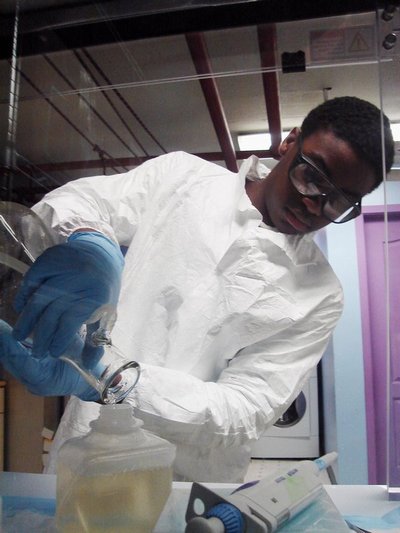February 18, 2010
With UW help, K-12 students do first-ever work on plasticizers in area water
Eight public school students, working with the UW-based SoundCitizen organization, have launched what is probably the nation’s first effort to sample plasticizers in marine waters.
Plasticizers are chemicals used when making such things as water bottles, microwave trays and PVC pipe to make them flexible. The additives can be washed into fresh and marine waters when, for instance, plastics in a dump start to degrade. If people ingest plasticizers while eating or drinking from plastic containers then the additives would also be in treated wastewater discharged into waterways from sewage plants.
It got the public school students wondering about plasticizers making their way into Puget Sound so they are designing a plan to look this spring for four kinds of plasticizers in water samples from rivers, Puget Sound, homes and schools, according to Deana Scipio, UW doctoral student in education. Scipio and fellow doctoral student Shelley Stromholt are coordinators of the SoundCitizen apprenticeship program, now in its first year.
SoundCitizen is run by UW undergraduates through the laboratory of Rick Keil, associate professor of oceanography. It relies on University and community volunteers to collect water samples that are used in research on land-water interactions. SoundCitizen already has a good number of adult volunteers and one reason for the apprenticeship program is to involve young people in the process of scientific research, Keil says.
Part of SoundCitizen’s mission is to allow citizens to frame their own questions and experiments about fresh and marine waters. Thus, the apprentices formulated their own inquiry and decided to investigate plasticizers.
The project won’t be trying to determine if plasticizers are harmful or not, this is just a start toward finding out what kinds and amounts of plasticizers are present.
“Our interns are the first we know of to undertake a study of plasticizers in marine waters anywhere in the nation,” Scipio says.
Since fall, the apprentices have collected water samples and gained lab experience processing them. The students have also interviewed community members about their concerns.
“The students say this work feels different from science they do in school,” Scipio says. “This work is done using the same equipment and in the same place as real scientists.” One student recently talked to his science teacher and was able to be the expert and tell her about plasticizers, Scipio says.
The public school students — there are eight of them, ranging from an eighth grader to a couple of high school seniors — were recruited from two community programs. One is Passages Northwest, which provides experiential educational programs so girls develop leadership skills, and the other is BOLD, or Boys Outdoor Leadership Development, a YMCA program that does something similar for boys through outdoor experiences. The UW Institute for Science and Mathematics Education, directed by Associate Professor of Education Philip Bell, arranged the partnership. The institute develops such partnerships between University researchers and educational organizations in the region focused on enhancing diversity in fields of science, technology, engineering and math.
“We’re exploring how to meaningfully engage students who are underrepresented in science so they can learn about the scientific enterprise firsthand in a personally relevant way while developing connections that will help them pursue higher education if they choose to do that,” Bell says.
The apprenticeship program is funded by a grant to Keil and Bell from the National Science Foundation’s Opportunities for Expanding Diversity in the Geosciences program.
Scipio and Stromholt are with the Learning in Informal and Formal Environments Center, affiliated with the UW College of Education.



